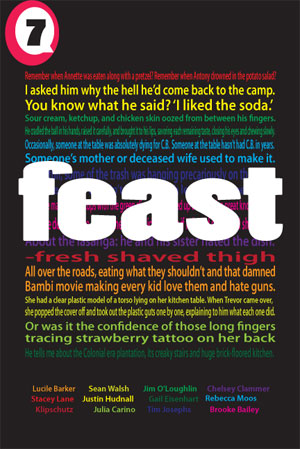He says he doesn’t want to write about those things. How his mother would force-feed him, and beat him, and force-feed him, and beat him. He says this standing next to the blue and green plaid couch on which I lie. He emphasizes beat by flailing his hands in the air. There is one specific story about lasagna. He doesn’t want to write about the lasagna, because as a kid he was forced to journal, and now he doesn’t like to write about his own experiences.
About the lasagna: he and his sister hated the dish. Together, they came up with a sneaky plan to throw it away during dinner. It worked. Though later his sister ratted him out. He was ten. The consequence was a drawn-out process of being locked in his room, then spanked. Locked in his room, then spanked. Later, his mother made him wear a sign at baseball practice that said Liar. She made it herself.
Instead of writing about these things, he writes fictional stories about anxious squirrels and trickster owls. His writing is good, has a point to it. And his craft is as lovely as his body. But he won’t write about when he was ten, he won’t write about the lasagna.
It took me awhile to learn how to spell this word, this dish that now disturbs him, but as I lie down on the blue and green plaid couch and hear him tell his story of why he now freezes up when faced with a situation of passive resistance, I know I will never forget how to correctly spell lasagna. His story must be told. Because as his hands flail about, he scratches his short and scruffy brown-orange beard and wonders out loud, Why do parents torture their children?
I know I will write his experience down. Because I can understand it. I was never forced to journal, and I was never force-fed, but I do understand where parents can affect the eating habits of their children.
***
I am ten and on my family’s houseboat called “The Reflection.” It is summer and my family and their friends are vacationing on this houseboat together. We are on Lake Powell, and anchor down at night in order to eat a family meal.
I’m standing near the table instead of sitting down to enjoy the meal, because my legs feel restless. The early evening sun shines in lazily through the windows and onto the plastic fold-away table. I grab a hot dog and eat it in about four chomps. Then I grab another, and chew it again in four gulps. I do not remember if they were hot or not, only that I wanted more. My family starts to notice my grab for a third one, and my father begins to tease me. “Good Lord, Chelsey! How many are you going to engulf tonight?”
My face starts to shine red and I am embarrassed and aware of my body now, and I still know that I want more, want to keep filling the hunger I cannot stop feeling. But now all ten pairs of eyes are on me—Grandma and Grandpa Clammer; my mom, dad, and sister; my grandparents’ friends, John and Rosemary; their son and daughter, Mike and Kim; and Mike’s friend Jeff. Twenty eyeballs looking at me, gawking at if I would actually eat that third one, and then have yet another.
That was the first time I became conscious of my eating, worried that people would recognize how much I ate. I felt a sign imprinted on my forehead, one that read Engulfer.
This paranoia has followed me for the past twenty years. Always feeling as if my eating were on display, I choke back the need to have more. And the eating disorder grows. And I am always wary of how much food I eat in front of others, especially my family.
Now, at thirty and twenty-nine respectively, he and I are both average sized beings. His body is lean, small, bony and light, though the fact of it bears heavily on my mind.
I can’t stop thinking about his back. About how his back was beaten by his mother, and how in love I am with that back, with all that it holds.
He has a raised mole on the left side of his lower back. It isn’t a dark one, isn’t something that would stand out if you looked at his skin. Next to this light-colored mole is the smooth part of his back, a hairless section with skin that glides under your fingertips just so. I call it “The Worry Stone.” How I can feel his back, lightly rub at the hidden strength under that soft skin, and press into him that all will be okay.
He was the president of his fraternity in college. As president, he and some other brothers got a tattoo on their backs of their emblem. A skull and cross bones bordered with a banner bearing the phrase If you can’t—you can’t stay. This is something that doesn’t quite fit his body, his attitude now. If you can’t (whatever it is you can’t), then he will work with you. Though I see his shoulders hunched in front of his computer, his work situation dragging him down. The curve in his back is stressed, as the annoying work stresses on him. The thought of the tattoo stays. He wants to leave his work. If they can’t treat him right, then he can’t stay.
I light a blue candle near his bed at night, and rub oil into the skin on his back, deep into the places past his tattoo. The blue wax melts out onto his bed stand. It pools on the wood as I rub away his tension, as I get deeper into the layers that are bothering him. I wonder at what all he holds in that back, what memories stay stuck inside, as well as what parts of his back keeps him feeling strong, what it is that keeps him going, keeps him to stay.
And I wonder at how that back must have felt as his mother beat him into submission. Where was her love for him then? I feel my own back, feel my own thoughts of my relationship to food near my family, feel my own embarrassment, discomfort around food at ten years old. And as he sits eating his saltines and peanut butter at the kitchen table, I wonder at how our bodies will grow, will feed into each other. Why do parents torture their children? He stands and he wonders. I offer some excuse such as hidden rage, and he quiets, sits down again, and slips another saltine into his remembering mouth. I grab my notebook and write down his story so the world can know, so I can tell his story as he can concentrate on his own exquisite animal stories. Then I sit down quietly next to him, and slip my own saltine into my mouth. He does not look at me as I do this, does not stare as I grab for another one.
Chelsey Clammer received her MA in Women’s Studies from Loyola University Chicago. She has been published in THIS, Stone Highway, Atticus Review, Sleet and Make/shift among many others. She received the Nonfiction Editor’s Pick Award 2012 from both Revolution House and Cobalt for her essays “BodyHome” and “I Have Been Thinking About,” respectively. She is currently finishing up a collection of essays about finding the concept of home in the body. You can read more of her writing at: chelseyclammer.wordpress.com.










